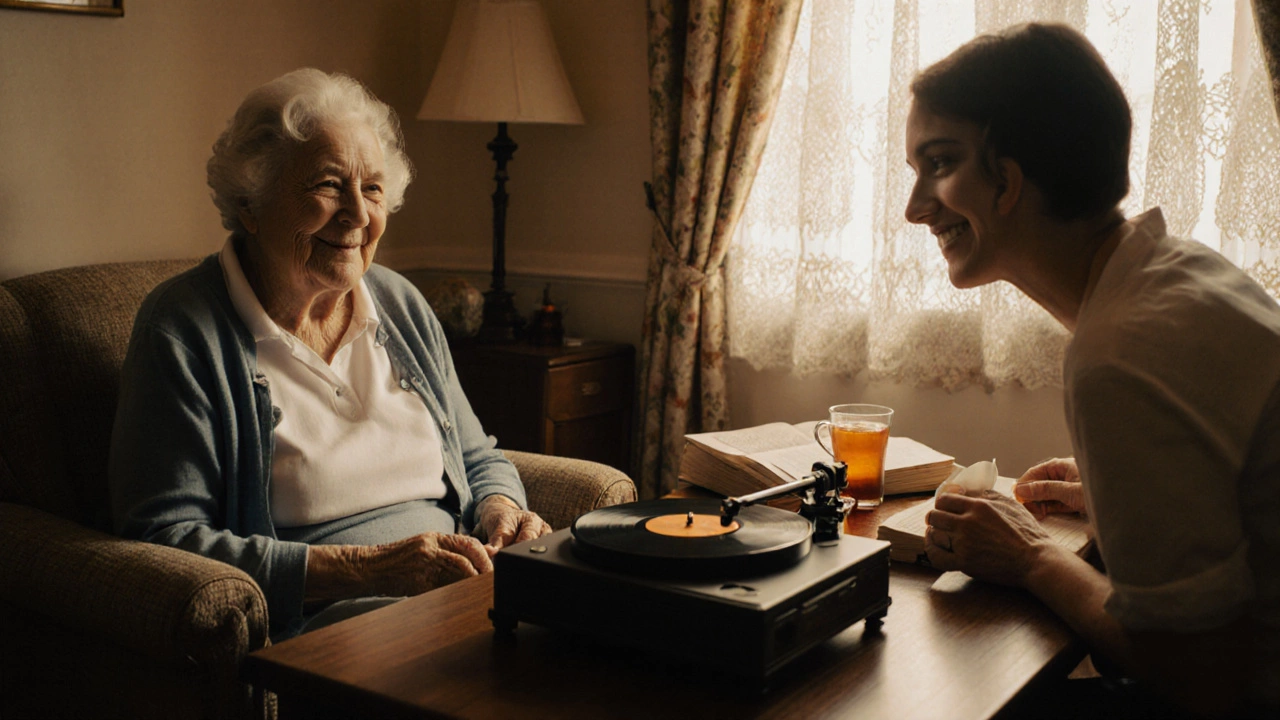Direct Charity Impact Calculator
How Your Time Creates Real Change
This calculator shows the real-world impact of your direct charitable time based on the activities described in the article. Just enter your available hours per month to see your potential impact.
Estimated Monthly Contribution
Based on your 5 hours/month commitment:
- 10 hot meals served at food banks (Feeds individuals with human connection)
- 1 child tutoring session (Potential to help with reading skills)
- 2 grocery deliveries to elderly residents (Provides essential care for vulnerable seniors)
- 0.5 home construction hours (Helps build shelter for families in need)
When people think of charity, they often picture fundraising walks, bake sales, or online donation drives. But those are indirect ways to help. Direct charitable activities are different-they put you right in the middle of the need. No middleman. No paperwork. Just you, your time, and someone who needs real, immediate support.
Feeding People Who Are Hungry
One of the most common direct charitable activities is serving meals at a homeless shelter or food bank. This isn’t just handing out a box of groceries. It’s making eye contact, asking someone how their day is going, and listening to their answer. In Bristol, organizations like The Big Issue Foundation and St. Monica’s Trust serve hot meals every evening. Volunteers don’t just plate food-they sit down with guests, share a conversation, and treat them like people, not statistics. This kind of interaction doesn’t just fill stomachs. It reminds people they’re not invisible.
Building Homes With Your Own Hands
Groups like Habitat for Humanity don’t just raise money-they build houses. Volunteers show up with hammers, saws, and safety gear, and they learn how to frame walls, lay insulation, or install windows alongside future homeowners. In 2024, over 3,000 UK volunteers helped construct 142 homes through Habitat affiliates. You don’t need to be a carpenter. You just need to show up. By the end of the day, you’ve helped create a roof over someone’s head. That’s direct impact. No donation receipt needed.
Tutoring Kids Who Fall Behind
Many children in low-income areas struggle with reading or math because they don’t get extra help at home. Direct charitable activity here means showing up once a week at a local school or community center to tutor. In Bristol, programs like Reading Buddies pair adult volunteers with primary school students for 45-minute sessions. You read together. You work on spelling. You celebrate small wins. One volunteer told me she started helping a boy who couldn’t read a single sentence. After six months, he was reading chapter books out loud. That’s not charity-it’s transformation.
Delivering Medicine and Groceries to Elderly Neighbors
For older adults who can’t drive or leave their homes, getting food or medicine isn’t a chore-it’s a daily struggle. Organizations like Age UK Bristol run volunteer delivery networks. Volunteers pick up prescriptions from pharmacies, grab groceries from local shops, and bring them directly to doorsteps. Some volunteers also check in: Is the heating on? Did you eat today? Are you feeling okay? These simple questions can prevent hospital visits and even save lives. In 2023, over 800 elderly residents in Bristol received weekly deliveries through this program. The value isn’t in the groceries. It’s in knowing someone cares enough to knock on your door.

Helping Refugees Settle Into a New Country
When families arrive in the UK as refugees, they often have nothing but the clothes on their backs. Direct support means meeting them at the airport, helping them open a bank account, teaching them how to use public transport, or walking them through their first job interview. Groups like Bristol Refugee Rights train volunteers to be mentors. One volunteer helped a Syrian family navigate the NHS system so their child could get glasses. Another taught a mother how to use a washing machine-something she’d never seen before. These aren’t grand gestures. They’re small, daily acts that rebuild dignity.
Cleaning Up Parks and Rivers
Environmental charity isn’t always about donations. Sometimes, it’s about showing up with gloves and trash bags. In Bristol, volunteers regularly clean the Avon River and local green spaces through initiatives like Clean Up Bristol. In one weekend last spring, over 500 people removed 3.2 tons of plastic, cigarette butts, and discarded furniture from just five parks. You don’t need a degree in ecology. You just need to show up. And when you see a child pick up a bottle and drop it in the bin because you showed them how, you know you’ve changed behavior-not just scenery.
Running Free Clothing Drives
Many people don’t realize how many families struggle to afford winter coats, school uniforms, or shoes. Direct charitable activity here means collecting gently used clothes, sorting them by size and season, and handing them out in person. In winter 2024, a church in Easton, Bristol, ran a clothing pop-up shop for families in need. Volunteers hung coats on racks, labeled sizes, and let people choose what they needed like they were in a real store. No forms. No means testing. Just dignity. One teenager told a volunteer, “I’ve never picked out my own coat before.” That moment mattered more than any donation.

Visiting People in Hospitals or Care Homes
Loneliness kills faster than many diseases. In care homes across the UK, nearly 40% of residents have no family visits in a month. Direct charitable activity means showing up-weekly, monthly, whenever you can-with a book, a deck of cards, or just your presence. Some volunteers play music. Others read poetry. One man in Bristol visits a dementia unit every Thursday and plays old jazz records. He doesn’t expect the residents to remember him. He comes because they deserve to be seen. That’s not volunteer work. It’s human work.
Teaching Skills That Lead to Jobs
Charity isn’t just about giving. It’s about empowering. Programs like Bristol’s Skills for Work train unemployed adults in basic digital skills-how to use email, apply for jobs online, or create a CV. Volunteers who are retired IT workers or marketing professionals spend two hours a week teaching small groups. One woman, after six weeks, got her first job in 12 years as a receptionist. She cried when she called to tell her tutor. That’s not charity. That’s a second chance.
Why Direct Action Matters More Than Ever
Donations are important. But they don’t always reach the people who need them most. Direct activities cut through the noise. They turn abstract problems into real relationships. When you serve a meal, you see the hunger. When you tutor a child, you see the frustration. When you deliver medicine, you hear the fear. That’s what changes people-not just the recipients, but the volunteers too.
Direct charitable work doesn’t require a big budget. It requires presence. It requires showing up, even when it’s messy, uncomfortable, or inconvenient. And in a world where so much of life happens behind screens, those moments of real human connection are the rarest-and most powerful-kind of charity.
What’s the difference between direct and indirect charitable activities?
Direct charitable activities involve you personally doing something that helps someone right away-like serving food, tutoring, or delivering medicine. Indirect activities involve raising money or collecting items for others to distribute, like organizing a fundraiser or donating clothes to a collection bin. Direct work builds relationships. Indirect work supports systems.
Do I need special skills to do direct charitable work?
No. Most direct activities only require you to show up with a willingness to help. You don’t need to be a teacher to tutor. You don’t need to be a builder to help construct a home. Organizations provide training for tasks like serving meals, using tools, or interacting with vulnerable people. The most important skill is kindness.
How often should I volunteer to make a real difference?
Even one hour a month can change someone’s life. But consistency matters more than frequency. If you can commit to once a week, even for an hour, you become a reliable presence. For kids, elderly neighbors, or refugees, knowing someone will come every Thursday is more valuable than a one-time big effort.
Can I do direct charitable work with my family or friends?
Absolutely. Many organizations welcome group volunteers. You can build a house together, clean a park as a team, or deliver meals as a family. It’s a powerful way to bond while making a difference. Some groups even offer special programs for families with kids.
What if I’m shy or nervous about meeting people in need?
It’s normal to feel that way. Most organizations start new volunteers with simple tasks-like packing food boxes or organizing clothes-so you can get comfortable. You don’t have to talk right away. Just being there, smiling, or handing someone a warm meal speaks louder than words. People are often more grateful than intimidated.
